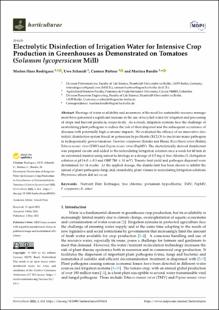Electrolytic Disinfection of Irrigation Water for Intensive Crop Production in Greenhouses as Demonstrated on Tomatoes (Solanum lycopersicum Mill)
Artículo de revista
2022-05-06
horticulturae
Shortage of water availability and awareness of the need for sustainable resource management have generated a significant increase in the use of recycled water for irrigation and processing
of crops and harvest products, respectively. As a result, irrigation systems face the challenge of
neutralizing plant pathogens to reduce the risk of their dispersal and the subsequent occurrence of
diseases with potentially high economic impacts. We evaluated the efficacy of an innovative electrolytic disinfection system based on potassium hypochlorite (KCLO) to inactivate major pathogens
in hydroponically grown tomatoes: Fusarium oxysporum (Synder and Hans), Rizocthonia solani (Kühn),
Tobacco mosaic virus (TMV) and Pepino mosaic virus (PepMV). The electrolytically derived disinfectant
was prepared on-site and added to the recirculating fertigation solution once a week for 60 min in
an automated manner using sensor technology at a dosage of 0.5 mg of free chlorine/L (fertigation
solution at pH 6.0 ± 0.3 and ORP 780 ± 31 mV). Tomato fruit yield and pathogen dispersal were
determined for 16 weeks. At the applied dosage, the disinfectant has been shown to inhibit the
spread of plant pathogenic fungi and, remarkably, plant viruses in recirculating fertigation solutions.
Phytotoxic effects did not occur.
Descripción:
horticulturae-08-00414-v3.pdf
Título: horticulturae-08-00414-v3.pdf
Tamaño: 2.263Mb
 PDF
PDF
 LEER EN FLIP
LEER EN FLIP
Título: horticulturae-08-00414-v3.pdf
Tamaño: 2.263Mb
 PDF
PDF
 LEER EN FLIP
LEER EN FLIP

















